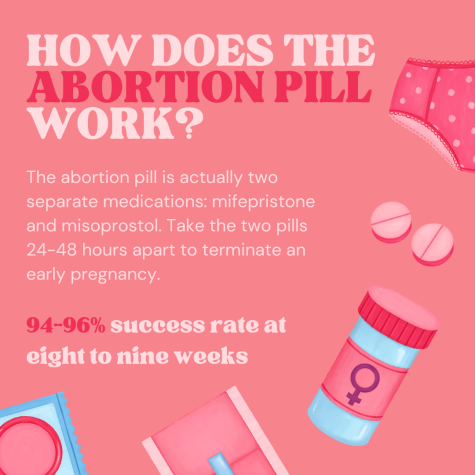Robin Marty breaks down the abortion pill
In recent weeks, the abortion pill has captured headlines in the media. A Supreme Court case opened a debate over whether or not access to the pill should be restricted, or even fully eliminated. Ultimately, on April 21, the justices voted to continue allowing citizens to access the pill.
In a post-Roe v. Wade United States, this is not the first and certainly not the last discussion to be had regarding access to reproductive healthcare, and abortions specifically. The possibility of reproductive rights shrinking is cause for alarm among many healthcare providers, activists, and patients seeking these services. Robin Marty, Director of Operations for the West Alabama Women’s Center, is one of those people feeling frustrated by debates over abortion access.
“I am formerly from Minnesota, and I moved down here to Alabama in 2021 to help run the West Alabama Women’s Center, which at the time, was the largest abortion provider in the state of Alabama, so it provided about half of the abortions in the state,” she said.
Things have changed dramatically since 2021, though. With the overturning of Roe v. Wade in 2022, the center shifted its role from an abortion clinic to a provider of other forms of sexual healthcare including birth control, prenatal care, HIV testing and treatment, and gender-affirming healthcare.
Bans on abortion in states like Alabama have caused great anger in Marty and her colleagues. Her book, Handbook for a Post-Roe America, is one example of the resistance Marty has shown towards recent Supreme Court decisions regarding reproductive rights.
“If you know that a person has the potential to die in childbirth, regardless of any other impact on their life, and that person does not want to be pregnant and have a baby… to me, it is a horrible thing to then force them to risk their life in order to continue that pregnancy when they don’t want to do it,” she said.
There are two ways to safely end a pregnancy: in-clinic abortion and the abortion pill. So, how does the abortion pill actually work?
The so-called pill actually includes two different medications called mifepristone and misoprostol, which have the ability to terminate an early pregnancy when taken. First, mifepristone stops the pregnancy from growing any further. Second, misoprostol initiates the termination, by opening the cervix and causing bleeding from the uterus.

Marty said, “So when we’re saying that they are going to consider taking the mifepristone off the market, what that means is that they can still use misoprostol, and it will be a process where you would still have the cervix open, you would still have the cramps, you would still have the labor that would get everything in the uterus out, but you would have to take more of [the misoprostol] because you would not be taking the [mifepristone] beforehand.”
The medications are two separate pills taken 24-48 hours apart, without a doctor or other medical professional needed to assist. This makes the process of taking them more comfortable or personal than an in-clinic procedure for many people, because it can be done at home with more privacy.
“A lot of people who want medication abortion will do that because they find that it feels more natural. They like the idea of having it passed as a miscarriage rather than having somebody actually go in and do an operation,” Marty said. “We especially find that for people who have been sexually assaulted, they often do not like the idea of an invasive procedure.”
The abortion pill is extremely effective, although the effectiveness does decrease as the pregnancy progresses. For example, for someone who is eight to nine weeks pregnant, the medication works 94-96% of the time. On the other hand, for someone who is 10 to 11 weeks pregnant, it works 87% of the time. Overall, though, mifepristone and misoprostol have been proven to work well for terminating a pregnancy.
Marty is a firm believer that access to such effective abortion medication should be preserved at all costs, and that the law should not tamper with the availability of sexual healthcare for any person. She said, “Every person should be able to make their choice as to how they want to have an abortion in the way that’s most comfortable for them.”
The future of abortions and other healthcare in the US remains uncertain, but for now, access to the mifepristone and misoprostol medications is still available.
For more information regarding reproductive and sexual healthcare, visit Planned Parenthood or other local clinics.
My name is Eliana Mann (she/her). I work as the Production Manager for The Rubicon online, and this is my fourth year on staff. At school, I’m a captain...
My name is Siri Pattison (she/her). I’m the Opinions Editor for The Rubicon Online. At school, I’m involved in the Antiracist Group, Student Activities...